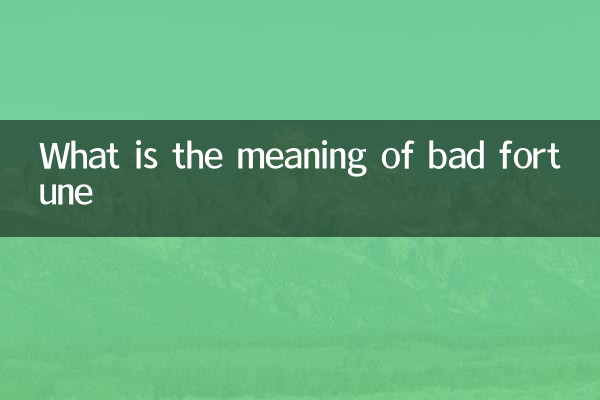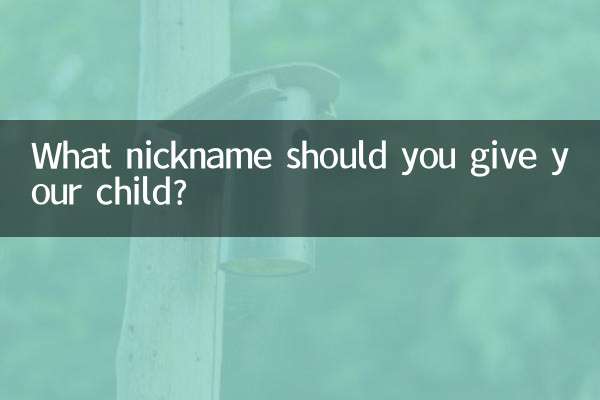What is the meaning of bad fortune
In traditional Chinese culture, "returning fortune" is a custom full of symbolic meaning, which is especially common during the Spring Festival. Many families will paste the word "福" upside down on their doors or windows, which means "good luck arrives" (homophoned as "inverted blessing"). This custom not only carries people's yearning for a happy life, but also embodies the wisdom and humor of Chinese culture.
The following is the hot discussion data on "Unlucky" and related traditional cultural topics on the Internet in the past 10 days:

| topic | heat index | Main discussion platform | Follow the crowd |
|---|---|---|---|
| The origin of the Chinese character "福" posted upside down during the Spring Festival | 8,542 | Weibo, Zhihu | 25-40 years old |
| Modern inheritance of traditional customs | 7,213 | Douyin, Bilibili | 18-30 years old |
| Different blessing customs in different places | 6,895 | Xiaohongshu, Baidu Tieba | 30-50 years old |
| The art of calligraphy with the word "福" | 5,327 | WeChat public account | Over 40 years old |
The historical origins of bad luck
As for the origin of the word "福", there are many versions of the story circulating among the people. One of the most widely circulated theories is related to the Zhu Yuanzhang period of the Ming Dynasty. It is said that Zhu Yuanzhang once ordered that the word "福" be posted on the door on a certain day as a mark, but an illiterate family posted the word "福" upside down. Zhu Yuanzhang was furious and was about to punish him. Empress Ma cleverly explained that "luck has fallen", which means "luck has arrived". This not only resolved the crisis, but also spread this custom.
Another version is related to the palace of Prince Gong of the Qing Dynasty. It is said that on the eve of the Spring Festival one year, the chief steward, in order to please his master, ordered someone to paste the word "福" upside down on the door, which meant "luck comes to the palace". Prince Gong was very happy and rewarded the housekeeper heavily. From then on, the custom of pasting the word "Fu" upside down spread in the capital.
The cultural connotation of bad luck
Pasting the word "福" upside down is not only a custom, but also contains rich cultural connotations:
1.homophonic culture: The homophony of "pour" and "arrive" in Chinese reflects the Chinese people's wisdom in using language arts.
2.best wishes: Expresses people’s yearning and expectation for a happy life.
3.Break the old and establish the new: By breaking the convention, it symbolizes saying goodbye to the old and welcoming the new.
4.Humor and wisdom: Shows the unique sense of humor and life wisdom of the Chinese people.
The following are the differences in pasting the character "福" in different regions:
| area | Features of pasting method | special meaning |
|---|---|---|
| Beijing | Stick it upside down on the door, stick it on the front inside the house | Blessings at home |
| Jiangnan | Water tank, rice tank upside down | Blessings do not flow out |
| Guangdong | The lintel is pasted with the word "福" in red upside down | Good luck |
| Fujian | A small "blessing" is posted next to the shrine. | Bless the whole family |
The bad luck culture in modern society
With the development of the times, the custom of bringing bad luck is also constantly innovating. The following new trends have emerged in recent years:
1.digital blessing: Young people share creative designs of the Chinese character "福" through social media, such as integrating QR codes into the Chinese character "福".
2.Environmental blessing word: Fu stickers made of biodegradable materials not only inherit culture but also protect the environment.
3.Interactive blessing word: AR technology makes the static character "blessing" come alive. After scanning, you can see the blessing animation.
4.global communication: As Chinese people spread all over the world, the custom of bringing bad luck has also become a symbol of Chinese cultural export.
The seemingly simple custom of pasting the word "福" upside down actually carries the long-standing cultural tradition and wisdom of the Chinese nation. It is not only the expectation for a better life, but also the embodiment of the unique charm of Chinese culture. In the context of the new era, we must not only inherit the cultural connotation of this custom, but also inject new vitality into it, so that the good wishes of "good fortune" can be spread forever.

check the details

check the details